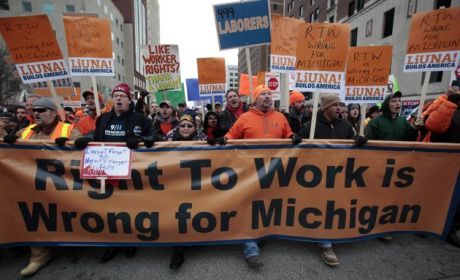Features
You are here
Michigan: wake up call for the Canadian labour movement

December 21, 2012
The passage of "right to work" legislation in Michigan has been called a catastrophe for the US labour movement. Michigan, the birthplace of industrial unionism, is the 24th state to enact legislation that means workers can opt out of the union.
The legislation was rammed through the state assembly by Republican governor, Rick Snyder. Snyder, like Wisconsin Governor Scott Walker, publicly stated he would not push for "right to work." He changed his tune and in one week introduced a bill and had it passed with no public hearings or consultations.
This undemocratic event did not go unchallenged: 12,000 trade unionists descended on the Michigan capital in Lansing to protest the change, where they were met by police with tear gas.
The economic crisis and the austerity "solution" are the cover for grabbing hard fought for union rights. The post-war "truce" between labour and capital that followed the massive working class upsurge, in the 1930s and1940s, has come to an end.
This is a chilling development for US labour and it is a big wake-up call for the Canadian labour movement as well. The public sector unions with the highest union density--just over 30 per cent--is under attack from every level of government in every province. Bill 22 in BC and Bill 115 in Ontario, both enacted by Liberal governments, attack teacher bargaining rights. Harper’s Tories undermined bargaining rights repeatedly by preempting strikes and job action through legislation for postal workers, Air Canada and CP rail workers. The Tories just passed legislation to force unions to open their books and they have floated a plan to attack the Rand Formula.
Behind the push in the US are the flag bearers of US capital like the Koch brothers and the DeVos family in Michigan. These billionaires have poured millions of dollars into anti-union campaigns, the Tea Party and politicians like Walker and Snyder. Canadian capital is more covertly funding anti-union policy groups like Fraser Institute and The Canadian Labour Watch Association (CLWA) to do its dirty work. But any notion that capital is kinder or gentler in Canada is a myth.
Despite the overt union-busting by capital and governments in the US and Canada, the response of Canadian labour leaders has been shockingly cool. One labour activist called it "fiddling while Rome burns."
Labour bureaucracy and the rank-and-file
As the pillars of collective bargaining are being eroded at a brisk pace, labour leaders are surreally calling for bargaining as usual. Even worse, some leaders are offering up concessions, as the CAW did this fall despite 90 percentile strike votes in hand and car companies posting profits. The response by labour leaders to Bill 115 is another sad example of inaction Passed by the Ontario Liberals, Bill 115 is draconian in its scope, giving the Minister of Education complete control over teachers’ contract. Teachers union leaders and the leaders of other public sector workers, in the Ontario Public Service Employees union (OPSEU) facing the same threats, have offered no strategy to fight. Only the Elementary teachers union (ETFO) has moved into action with one-day strikes, under pressure from its membership. OPSEU leaders have even taken a further step away from a fightback by disaffiliating from the Ontario Federation of Labour (OFL) just when labour movement solidarity is most needed.
The demoralization that the inaction of the leadership has produced, especially among activists, has some musing that maybe getting rid of the Rand Formula would force the unions to step up to the plate. But the end of the Rand formula would be a step backward for labour, even if it would not necessarily spell the end of trade unionism,.
That the labour leadership is shrinking from the fight just at the moment when they should be leading is really no surprise. First of all, the material conditions (higher salaries and removal from the daily grind of the workplace) and very function of the labour bureaucracy (negotiating the terms of exploitation between capital and labour) make the trade union leadership reluctant in general to lead fights. Secondly, we are decades away from the last period of labour struggle in the 1970s; the current labour leadership, entrenched in business unionism, is wed to its position as negotiator the employer and workers.
The question of who will win this struggle, workers or employers, is very much in the balance at this moment. Transformation of the union into a more militant fighting force for workers is not likely going to come from this leadership. But, as the Chicago teachers, Toronto Library workers and Rio Tinto workers have shown it is possible for rank and filers to grab hold of existing union structures and engage members to fight.
Demonstrations at the Ontario Liberal leadership convention on January 26 called by the OFL will be an important opportunity to up the ante against the attacks on union rights.
Section:
- Log in to post comments










